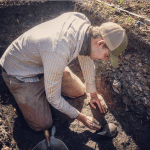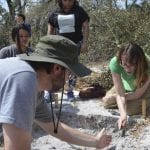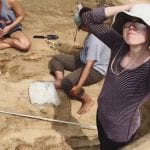Biography
I am a Professor of Anthropology and in the National Center for Integrated Coastal Research, specializing in archaeology. I joined the UCF faculty in 2007 after receiving Ph.D. and Master’s degrees from the University of Colorado at Boulder. I have two primary research sites: the Pacific coast of Oaxaca, in southern Mexico, and the Atlantic coast of Florida around the Indian River Lagoon.
My research has two primary themes:
- The origins and organization of early complex societies. Using a wide range of methods and analytic tools, I consider the ways that people developed and maintained large-scale governing regimes (sometimes called “states” or “polities”) in ancient Mexico. While I find the question of preindustrial governance interesting in all time periods, I have particularly focused my attention on the origins of early polities in southern Mexico.
- Human-coastal interactions over deep time. Nearly half of all people on the planet live within 60 miles of the ocean today. People have been living near coasts and relying on coastal resources for hundreds of thousands of years. My research in both Mexico and Florida evaluates how people have impacted, and have been impacted by, coastal ecosystems. I am particularly interested in understanding how differences in values, governance, demography, and economy affect the way that people engage with coastal resources and how those differences impact (or don’t impact!) ecosystem health.
I have active research exploring both themes in Oaxaca and coastal interactions in Florida. I conduct fieldwork in both regions, including archaeological survey and excavation, mapping, and remote sensing using ground-penetrating radar (GPR). I direct the Latin American and Caribbean Archaeology (LACA) Laboratory, where my students and I analyze artifacts and ecofacts collected during field research.
My research has been supported by the National Science Foundation, the National Geographic Society, the John Templeton Foundation, and Argonne National Laboratories. I have published my results in both English and Spanish. I have published in a wide range of scholarly journals, and edited and contributed to Religion and Politics in the Ancient Americas, published by Routledge in 2017.
Undergraduate and graduate students who work with me have opportunities to gain first-hand experience in the field and laboratory. Since 2017, I have co-directed the Cape Canaveral Archaeological Mitigation Project, a for-credit internship run in collaboration with the U.S. Space Force. I have directed or co-directed field projects in Mexico since 2003.
Research Specialization
Archaeology of Mesoamerica, archaeology of the Greater Southwest, poststructural social theory, origins of complex societies, middle-range societies, household and community archaeology, ceremonial and ritual practices, near-in remote sensing, public education.
Highlights
Please visit the News section for Dr. Barber to find the latest information on her accomplishments.
August 2013:
Congratulations to Dr. Sarah Barber on being promoted to the rank of Associate Professor effective Fall 2013!
2012:
Congratulations to Dr. Sarah Barber on receiving the Teaching Incentive Program Award.
October 2012:
Congratulations to Dr. Sarah Barber for her recent grant award “Religion and Political Innovation in Formative Mesoamerica.” This is a two year award on the study of the role of religion in Formative Period Mesoamerican political innovations. The research includes an archaeological field project and release time to write a book. The project has support from the Religion and Innovation in Human Affairs (RIHA) Program of the Historical Society funded by the John Templeton Foundation through the University of Colorado Boulder.



